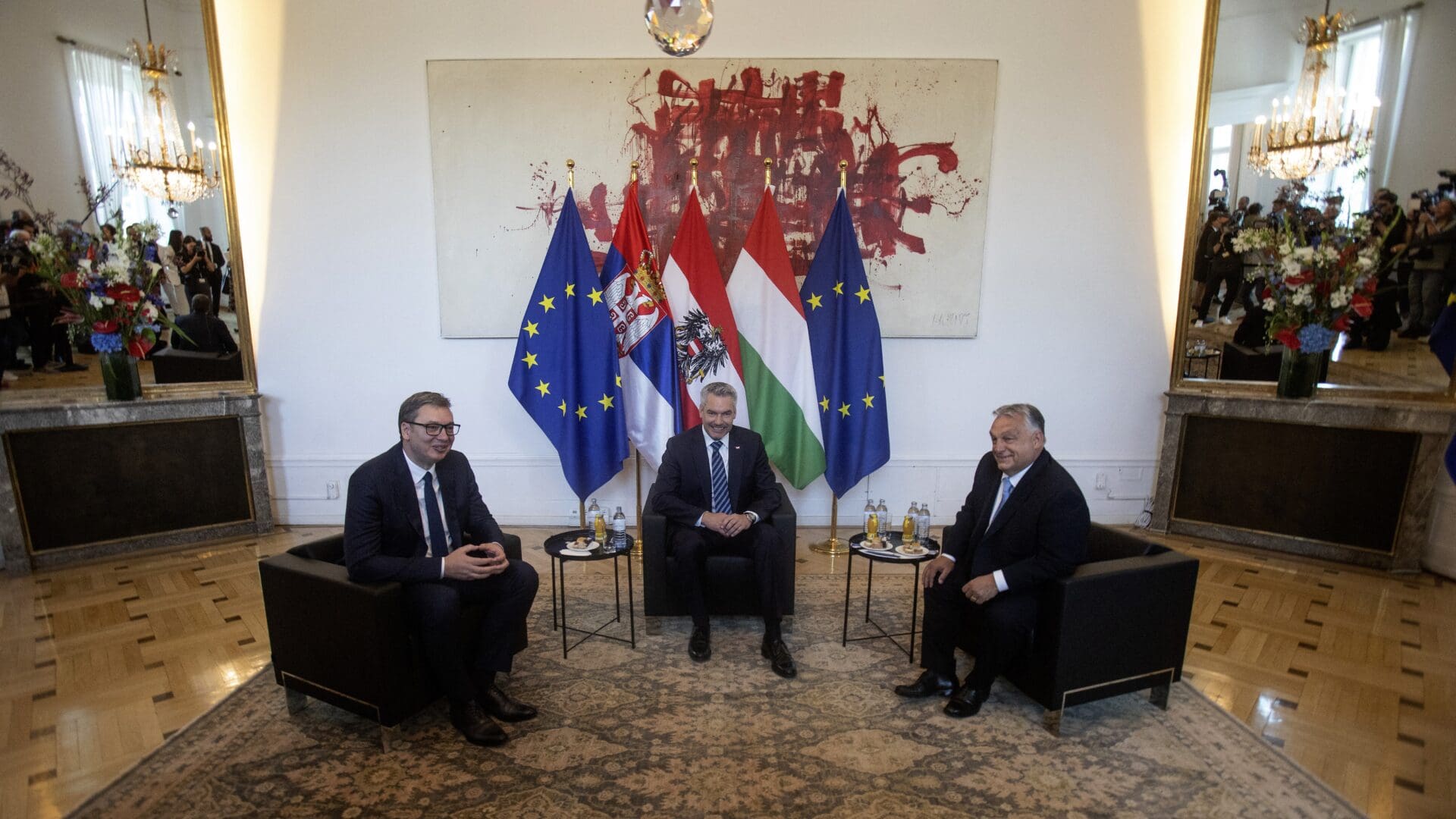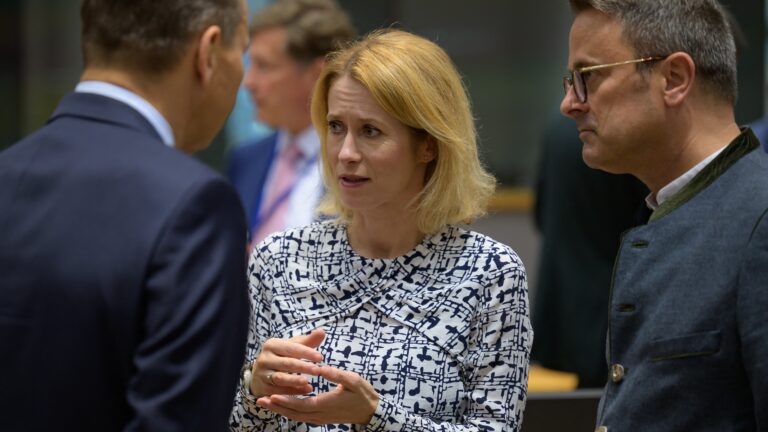In his speech at the annual conference of the Hungarian Chamber of Commerce and Industry on Monday, Viktor Orbán discussed cooperation between Central European states, among other issues. The Hungarian Prime Minister stated that for a long time, the idea of a V4 structure with Poland, the Czech Republic, and Slovakia should not be abandoned, as it still has ‘some life left in it’. Nevertheless, he suggested that another possibility for cooperation between sovereign states should be considered. ‘In addition to Hungary, the Slovaks and Serbs have also been involved in this, and there will be an election in Austria in September. Therefore, there could easily be an Austrian–Hungarian–Slovak–Serbian cooperation in the next period, which does not replace the V4 but appears alongside it,’ PM Orbán concluded.
As reported by Hungarian Conservative, the first summit of the Visegrád Group (V4) prime ministers this year was held in Prague on 27 February, and the talks had no less at stake than keeping cooperation alive. At a press conference following the summit, all four leaders—alongside Viktor Orbán, Polish Prime Minister Donald Tusk, Slovak Prime Minister Robert Fico, and Czech Prime Minister Petr Fiala—supported the continuation of the V4 partnership in areas where their interests coincide. However, there are fears that diverging views on the war in Ukraine could undermine potential cooperation on common interests as well.
Nothing illustrates the fragility of the V4 format better than the fact that, less than a week after the summit, Donald Tusk, who has consistently criticized the Hungarian government since assuming office last December, addressed Minister of Foreign Affairs and Trade Péter Szijjártó in an unacceptable tone for an ally. ‘The issue of feasting on the day of Alexei Navalny’s funeral...is just another sign of the Hungarian government, which we find difficult to accept for moral and political reasons,’ stated the Polish Prime Minister. For context, on Friday last week, the same day when the funeral of Russian opposition leader Alexei Navalny, who tragically passed away in prison, was held, Péter Szijjártó engaged in discussions with Russian Foreign Minister Sergei Lavrov at a diplomatic forum in Türkiye.
Cooperation Already in Place
For many years, V4 cooperation had been based on good relations between Hungary and Poland, but this changed radically with the Polish elections last October. Under the leadership of Donald Tusk, a government has emerged in Poland which has no interest whatsoever in representing the real concerns of the Central European states against the will of Brussels. It is therefore not surprising that Hungary is looking for other ways of cooperation, especially when it comes to partnerships that have already been proven to work.
Austria, Hungary, and Serbia have been cooperating for many years in a way that is crucial for Europe’s security.
To halt illegal immigration and safeguard the external borders of the European Union, the three countries formally established a joint border protection force in November 2022, with the primary objective of easing the mounting migratory pressure on the Balkan route. This is particularly significant now, given the 1.14 million asylum applications in the EU in 2023—the last time when a similarly high number was recorded was during the 2015 migration crisis.
Joining the trio is Slovakia, a country that has experienced a significant political shift after Robert Fico and his party won early elections last September. The seasoned politician maintains a strong relationship with Viktor Orbán, and the interests of the Hungarian and Slovak governments align in numerous areas. One such area is illegal immigration, with Slovak police routinely assisting in safeguarding Hungary’s southern borders. ‘We are not at all pleased with attempts to legitimize illegal migration; we aim to protect our borders and assert our right to determine who enters our country,’ PM Orbán stated during a press conference following the leaders’ meeting in January.
Ukraine Makes the Partnership Stronger
In addition to illegal migration, the four states are united by their divergent perspectives on the conflict in Ukraine compared to the mainstream Western stance. Given Serbia’s traditionally pro-Russian populace, it is unsurprising that the Serbian government has refrained from endorsing Western sanctions against Russia, despite significant pressure from Western powers, particularly the United States. Just last week, Serbian President Aleksandar Vučić met with Ukrainian President Volodymyr Zelenskyy, affirming Kyiv of his support while emphasizing that only through constructive dialogue and diplomacy can the conflict be resolved.
Austria stands as one of Europe’s non-aligned countries concerning NATO membership. With Finland’s and Sweden’s accession, Austria remains alongside Switzerland as one of the few European states maintaining military neutrality—a stance unaffected by the conflict in Ukraine. Much like Budapest, Vienna has refrained from involvement in arms deliveries to Ukraine from the outset, and Chancellor Karl Nehammer has consistently criticized Brussels’ policy towards Ukraine. In response to Emmanuel Macron’s suggestion that Western nations might consider deploying troops to Ukraine, Nehammer underscored the necessity of preventing further escalation of the conflict and urged the exploration of new strategies to bring about an end to the war. He noted that
Europe must extend its cooperation beyond the ‘Western echo chamber’ and engage with BRICS countries.
‘Above all, the West needs China and India to look for a peace solution. These two countries must be spoken to on an equal footing,’ Nehammer stated.
Before Robert Fico assumed power, the Slovak government consistently fulfilled the demands of both Kyiv and Brussels, which consisted of providing military support to Ukraine in its conflict against Russia, including some Zuzana 2 howitzers from Slovakia’s own arsenal. One of the main messages of Fico’s campaign was to halt arms deliveries, with the Slovak Prime Minister constantly advocating for peace. During a visit to Hungary in January, Fico emphasized that, as long as he remained at the helm of the Slovak government, he would not align with other EU nations to exert pressure on Hungary regarding its stance on the conflict in Ukraine.
Beyond illegal migration and the conflict in Ukraine, the four countries also engage in various areas of shared cooperation. These include cross-border infrastructure investments—exemplified by projects like the Budapest–Belgrade railway line, which Brussels seeks to impede. Additionally, cooperation extends to addressing concerns regarding national minorities across borders, fostering economic and trade relations, promoting tourism, and other areas.
Bringing Serbia into the EU
However, there exists a significant drawback to the ‘cooperation of sovereign states’ when compared to the V4: Serbia is not a member of the European Union. While Belgrade applied for membership in 2009 and negotiations commenced in 2013, the process has recently come to a standstill. Brussels attributes this stagnation to several factors, including Serbia’s close ties with Russia, the deterioration of the rule of law in Serbia, and the unresolved situation in Kosovo. According to current projections, Serbia is unlikely to attain EU membership until at least 2030, a circumstance that may complicate cooperation with its three EU allies.
Nevertheless, such a partnership could potentially influence the advancement of the enlargement process. Hungary has notably been one of the EU’s most vocal proponents of promoting enlargement in the Western Balkans, recognizing its potential to significantly enhance European security by mitigating illegal immigration. Austria shares a similar perspective and proposed the concept of ‘gradual integration’ last year. This approach suggests that candidate countries would initially integrate into the EU in specific policy areas before full membership. Those would include policy areas ranging from certain aspects in the EU single market, such as ‘industrial and consumer goods, public procurement, eCommerce’, ‘further trade through customs cooperation’, energy and transport infrastructure and enhanced cooperation with the EU border agency Frontex and Europol. ‘To be integrated early on into a policy sector, it will also mean that the respective country will have to adapt to the EU’s acquis, it will have to apply the same rules as we apply and with that be much better prepared to join and be active members from the first day onwards,’ EU Commissioner for Enlargement Olivér Várhelyi stated regarding the gradual integration process.
As PM Orbán noted, the Austrian–Hungarian–Slovak–Serbian cooperation is not supposed to replace the V4 format but rather complement it. Nonetheless, it is undeniable that as the V2+V2 (Slovakia–Hungary and Poland–Czech Republic) countries hold markedly divergent positions on fundamental issues, the new partnership of sovereign states could garner increased emphasis.
Additionally, Austria is scheduled to hold elections this year, with the Freedom Party of Austria (FPÖ) currently anticipated to secure victory. Should the right-wing party assume power, cooperation between Hungary, Slovakia, Serbia, and Austria may undergo further development.
Related articles:








